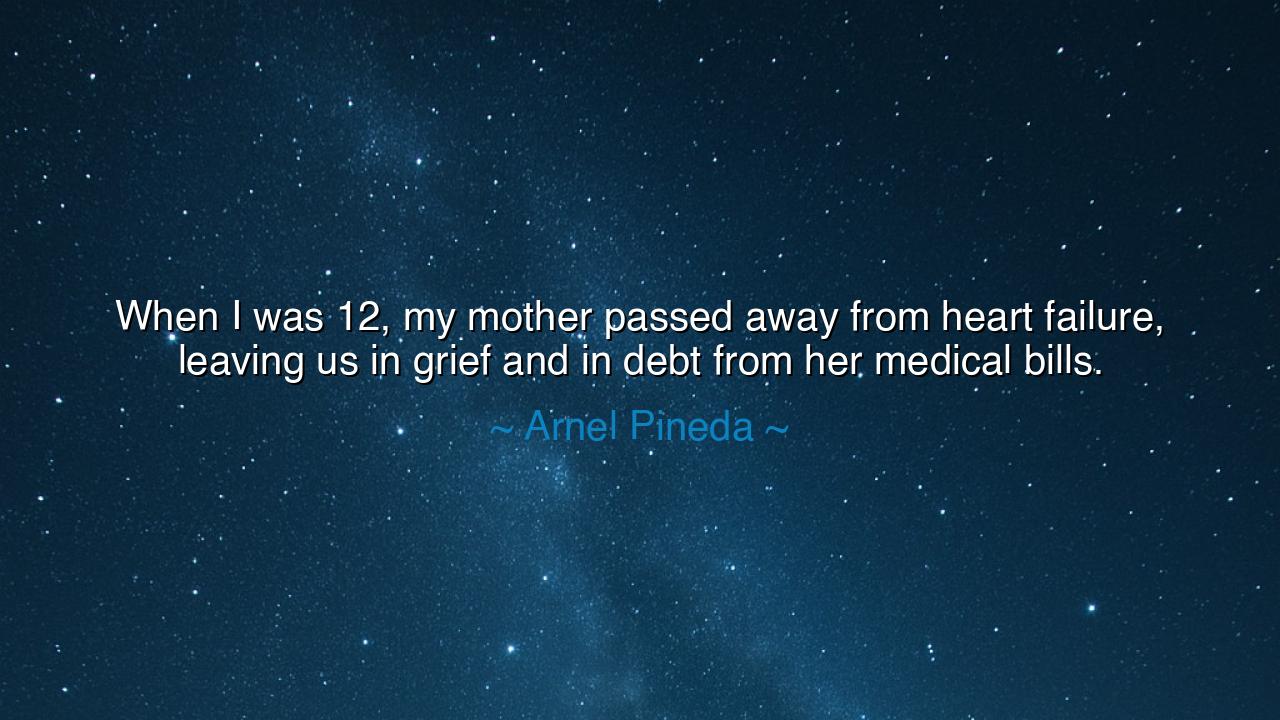
When I was 12, my mother passed away from heart failure, leaving
When I was 12, my mother passed away from heart failure, leaving us in grief and in debt from her medical bills.






The words of Arnel Pineda—“When I was 12, my mother passed away from heart failure, leaving us in grief and in debt from her medical bills.”—are not merely a recollection of tragedy; they are the first notes in a lifelong song of endurance. In this single sentence lives the weight of loss, the cruelty of poverty, and the awakening of resilience. It is a story both personal and universal, for every age and nation has known the ache of a child losing a mother, and the injustice of grief compounded by debt. His words carry the sorrow of millions who have stood helpless before illness, who have watched love slip away beneath the burden of medicine’s cost. Yet within that sorrow also lives a spark—the beginning of a soul tempered by hardship, destined to rise through suffering into strength.
To understand this quote, one must see Arnel Pineda’s life not as a tale of fame, but as a testament to survival. Born into humble circumstances in the Philippines, he lost his mother—the anchor of his childhood—at an age when most children are still learning the shape of the world. Her death from heart failure did not only shatter his heart; it cast his family into poverty, as unpaid medical bills became chains around their future. Grief became his teacher, and the streets became his classroom. In the markets and alleys of Manila, he learned to sing—not from joy, but from the necessity of life. It was through this pain that his voice, raw and unguarded, would one day carry across oceans and stages. His quote, then, is not only a remembrance of loss—it is the seed of his destiny.
In his lament, there echoes the eternal struggle between love and mortality, between the fragility of life and the cost of saving it. Throughout history, humanity has faced this same sorrow. In ancient Greece, Asclepius, the god of medicine, was struck down by Zeus for daring to heal beyond the limits of divine law, for his compassion threatened the balance of life and death. The ancients knew that to save a life was sacred—but also perilous, often costly. In Arnel’s story, the tragedy is more human than mythical: a mother lost not to fate alone, but to the weight of a system where the price of healing becomes the thief of hope. His pain, therefore, is not only a personal wound but a reflection of a world that often values medicine as commerce rather than mercy.
Yet from this darkness rises a lesson of fortitude and transformation. The boy who once scavenged for food and sang for coins would one day rise to become the voice of Journey, carrying with him the memory of his mother in every note. His triumph was not born of privilege or luck, but of faith that pain could be turned into power. The grief that once silenced him became the force that drove him to sing louder, to live fully, to make the name of his mother echo in the applause of strangers. Like the phoenix of ancient legend, he emerged from the ashes of despair reborn, not untouched by sorrow, but refined by it.
The story of Arnel’s mother also speaks to the sacred bond between parent and child, and the enduring influence of a mother’s love even beyond death. Though she was gone, her memory became his compass. Her sacrifices, though they led to debt and despair, gave birth to a strength that would later lift her son from the depths of poverty. This reflects the ancient wisdom that the spirit of the departed never leaves the living—it guides, shapes, and protects through unseen ways. Just as Telemachus was guided by the spirit of Odysseus in Homer’s tales, so was Arnel guided by the echo of his mother’s love. Her passing, though tragic, became the silent foundation upon which his life was rebuilt.
From Arnel Pineda’s story, we draw a timeless truth: that suffering can be the forge of greatness. Life will strip us of comfort, test our endurance, and demand that we keep singing even when our hearts are broken. Yet it is in those moments—when all is lost—that the human spirit reveals its divinity. Grief, when embraced with courage, does not destroy; it transforms. The poor child who faced death and debt did not surrender to despair—he learned to create beauty from it. Every person, in their own life, will stand at such crossroads, and must choose: to let sorrow harden the heart, or to let it deepen the soul.
Let the lesson be this: when the storms of loss and hardship come, do not curse them as the end of your story. They may be the beginning. Take your pain, as Arnel did, and make of it a song. When love is lost, let gratitude remain. When poverty weighs upon you, let faith be your wealth. For even from the ruins of childhood, a voice can rise that shakes the world. And in that voice, somewhere, the echo of a mother’s heart still beats—reminding us that from death, life can sing again.






AAdministratorAdministrator
Welcome, honored guests. Please leave a comment, we will respond soon